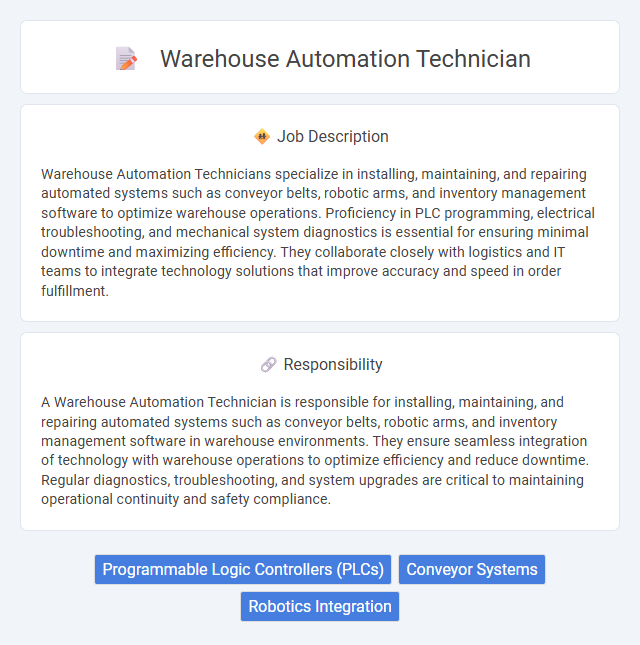
Warehouse Automation Technicians specialize in installing, maintaining, and repairing automated systems such as conveyor belts, robotic arms, and inventory management software to optimize warehouse operations. Proficiency in PLC programming, electrical troubleshooting, and mechanical system diagnostics is essential for ensuring minimal downtime and maximizing efficiency. They collaborate closely with logistics and IT teams to integrate technology solutions that improve accuracy and speed in order fulfillment.
Individuals with strong technical skills and a comfort level working with machinery and software are likely to thrive as Warehouse Automation Technicians. Those who prefer physical activity combined with problem-solving tasks may find this role suitable, while people who avoid hands-on technical work might struggle. The job probably requires attention to detail, adaptability to fast-paced environments, and the ability to troubleshoot automated systems efficiently.
Qualification
Warehouse Automation Technicians require proficiency in mechanical, electrical, and computer systems to ensure seamless operation of automated warehouse equipment. A strong foundation in robotics, PLC programming, and troubleshooting complex machinery is essential. Certifications in industrial automation and hands-on experience with conveyor systems and automated storage solutions enhance job qualifications significantly.
Responsibility
A Warehouse Automation Technician is responsible for installing, maintaining, and repairing automated systems such as conveyor belts, robotic arms, and inventory management software in warehouse environments. They ensure seamless integration of technology with warehouse operations to optimize efficiency and reduce downtime. Regular diagnostics, troubleshooting, and system upgrades are critical to maintaining operational continuity and safety compliance.
Benefit
Warehouse Automation Technicians are likely to experience increased job stability due to growing demand for automation expertise in logistics. Skills in robotics and system maintenance may enhance career advancement opportunities and salary potential. Employment in this field probably offers a safer and more efficient working environment by reducing manual labor and operational errors.
Challenge
Warehouse Automation Technicians likely encounter complex challenges involving the maintenance and troubleshooting of advanced automated systems. They probably need to adapt quickly to evolving technologies while ensuring minimal downtime in high-demand environments. The role may require strong problem-solving skills to efficiently address unexpected mechanical or software malfunctions.
Career Advancement
Warehouse Automation Technicians play a pivotal role in maintaining and troubleshooting automated systems, enabling seamless logistics operations. Mastery in robotics, PLC programming, and IoT integration positions these technicians for rapid career progression into specialized roles such as Automation Engineer or Systems Analyst. Continuous upskilling and certifications in emerging technologies enhance opportunities for leadership positions in warehouse management and industrial automation fields.
Key Terms
Programmable Logic Controllers (PLCs)
Warehouse Automation Technicians specialize in programming, maintaining, and troubleshooting Programmable Logic Controllers (PLCs) to optimize automated storage and retrieval systems. Mastery of PLC languages such as Ladder Logic and Function Block Diagram is crucial for enhancing the efficiency of conveyor belts, robotic arms, and inventory management systems. Proficient use of PLC diagnostic tools ensures minimal downtime and streamlined warehouse operations.
Conveyor Systems
Warehouse Automation Technicians specialize in the installation, maintenance, and repair of conveyor systems, ensuring efficient material handling and workflow within distribution centers. Expertise in troubleshooting mechanical, electrical, and programmable logic controller (PLC) components is essential to minimize downtime and optimize system performance. Proficiency in interpreting technical schematics and adhering to safety protocols significantly enhances operational reliability and throughput.
Robotics Integration
Warehouse Automation Technicians specializing in robotics integration install, maintain, and optimize robotic systems to enhance operational efficiency in distribution centers. They apply expertise in programming, mechanical systems, and sensor technologies to ensure seamless interaction between robots and warehouse management software. Proficiency in troubleshooting and upgrading automated conveyors, robotic arms, and automated guided vehicles (AGVs) is critical for minimizing downtime and maximizing throughput.
 kuljobs.com
kuljobs.com